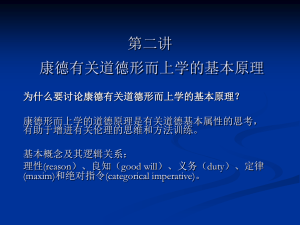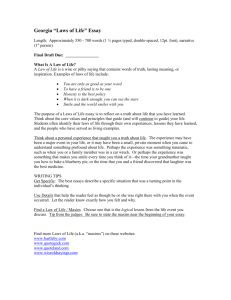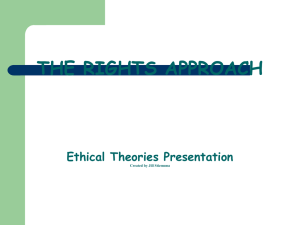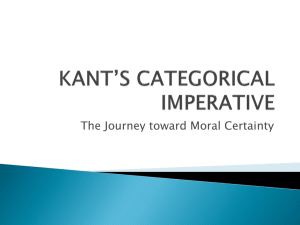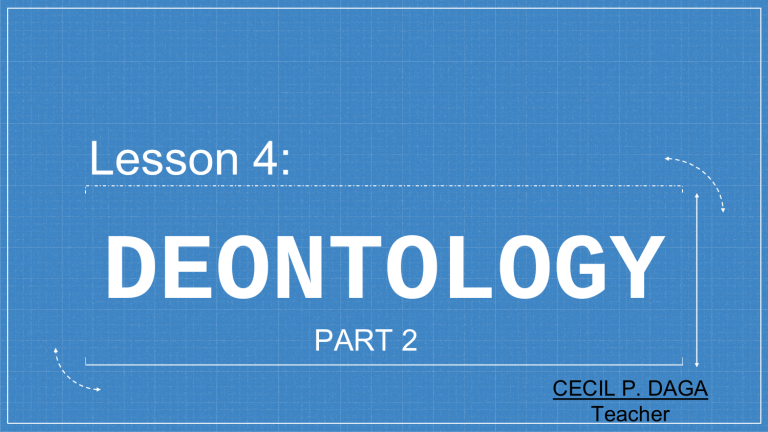
Lesson 4: DEONTOLOGY PART 2 CECIL P. DAGA Teacher UNIVERSALIZABILITY 2 To figure out how the faculty of reason can be the cause of an autonomous action, we need to learn a method or a specific procedure that will demonstrate autonomy of the will. 3 KINDS OF MORAL THEORIES SUBSTANTIVE MORAL THEORY Immediately promulgates the specific actions that comprise that theory. As such, it identifies the particular duties in a straightforward manner that the adherents of the theory must follow. TEN COMMANDMENTS FORMAL MORAL THEORY Does not supply or To be exact, thea rules formal commands straightaway. moral theory will not give us Provides us the "form” or a list of rulesof or “framework" thecommands. moral theory. To provide the "form" of aamoral Instead, it will give us set is to supply a procedure of theory instructions on how to and the criteria for determining, on make a list or one's own, the of rulesduties and moral Commands. moral commands. COOKBOOK 4 Kant endorses this formal kind of moral theory. Grundlegung zur Metaphysik der Sitten, embodies a formal moral theory CATEGORICAL IMPERATIVE provides a procedural way of identifying the rightness or wrongness of an action. Act only according to such a maxim, by which you can at once will that it become universal law. (Ak 4:421) 5 Four Key Elements ACTION MAXIM WILL UNIVERSAL LAW 6 Kant states that we must formulate an action as a maxim, which he defines as a "subjective principle of action” (Ak 4:422). In this context, a maxim consists of a "rule" that we live by in our day-to-day Iives, but it does not have the status of a law or a moral command that binds us to act in a certain way. Rather, maxims depict the patterns of our behaviour. Thus, maxims are akin to the "standard operating procedures" (SOPs) in our lives. We have many maxims in our daily lives, and we live according to them. 7 Kant claims that we ought to act according to the maxim "by which you can at once will that it become a universal law. What does it mean to will a maxim that can become a universal law? UNIVERSALIZABLE ("will that it become a universal law”) This means nothing other than imagining a world in which the maxim, or personal rule, that I live by were adopted by everyone as their own maxim. 8 This mental act of imagining a universalized maxim does not mean we picture a world in which everyone actually followed the maxim. Instead, we merely imagine the maxim as a law that everyone ought to follow. The proper way to imagine the universalized maxim is not by asking, "What if everyone did that maxim?" but by asking, “What if everyone were obligated to follow that maxim?" 9 A man who needs money, but has no immediate access to obtain it except by borrowing it from a friend. The predicament is simply about him borrowing money, while knowing that he cannot pay it back. False Promising Is it really wrong to borrow money without intending to pay it back? "When l am in need of money, I shall borrow it even when I know I cannot pay it back." 10 Remember that Kant states that we should act according to a maxim by which we can at once will that it become a universal law. What does it mean to universalize the maxim about borrowing money without intending to return it? Whenever she is in need of money, is obligated to borrow from another even when she knows she cannot pay it back. Hypothetical World 2 POSSIBILITIES make sense not make sense Logical plausibility Self-contradiction or logical impossibility 11 Let us assess that hypothetical world. If borrowing money without intending to pay were everyone's obligation to comply with, what would happen to the status of the universalized maxim? The purpose of borrowing money would be defeated because no one will lend money. The institution of money-borrowing would lose its meaning if everyone was obligated to borrow money without intending to pay it back. As a universalized maxim, it would self – destruct because it becomes impossible. 12 This is how Kant assesses it: Here I see straightaway that it could never be valid as a universal law of nature and be consistent with itself, but must necessarily contradict itself. For the universality of a law that each person, when he believes himself to be in need, could promise whatever he pleases with the intent not to keep it, would make the promise and the purpose that he may have impossible, since no one would believe what was promised him but would laugh at all such expressions as futile pretense (Ak 4:422). 13 Kant distinguishes between being "consistent with itself" "contradict itself" MAXIM: "When l am in need of money, I shall borrow it even when I know I cannot pay it back " “TO BORROW“ implies taking and using something with the intent to return it. 14 The contradiction is evident: to borrow (implies returning) but the intention is not to return. Of course, in the real world, many people borrow money without intending to pay, but it is the logical plausibility of the universalized maxim that is at stake. lt makes no sense. This is why Kant claims that the universalized maxim “could never be valid as a universal law of nature and be consistent with itself, but must necessarily contradict itself“. Thus, we can conclude that the act of borrowing money without intending to pay is rationally impermissible. Here, we discover two ways by which Kant rejects maxims. The universalized maxim becomes either (1) self-contradictory or (2) the act and its purpose become impossible. 15 What is the result of all these? We reveal the rational permissibility of actions insofar as they cannot be rejected as universalizable maxims. In contrast, those universalized maxims that are rejected are shown to be impermissible, that is, they are irrational and thus, in Kant's mind, immoral. But what does rational permissibility mean? Simply put, it refers to the intrinsic quality of an action that it is objectively and necessarily rational. Using the universalizability test, we can reveal the objective necessity of an action as rational. Therefore, we have demonstrated that borrowing money without intending to pay, as a kind of false promise, is objectively and necessarily wrong, insofar as it encounters a self – contradiction and logical impossibility when it is 16 universalized as a maxim. At this juncture, it has become clear how Kant's categorical imperative is a formal, not substantive, moral philosophy. Hence, we have the capacity to make our own list of moral commands. Instead of receiving them from others, we use our own rational faculty to produce our own list of moral duties. 17 REGGIE "When a suitcase that does not belong to me is left in my cab, I shall take its contents and sell them for my own benefit." Does the universalized maxim encounter a self-contradiction, or does it remain self-consistent? o Certainly, the meaning of ownership, when a suitcase belongs to someone, is to have the right to possess, use, and dispose of the thing as one pleases. o So what happens when a person is obligated to take possession of an object that does not belong to her? CONTRADICTORY 18 LYING PAY FOR WHAT YOU BUY RETURNING WHAT YOU BORROWED MURDER CHEATING SUBMITTING PROJECTS ON TIME ADULTERY Can the maxims in the specific actions under those moral issues be universalized without encountering selfcontradiction? It is for each one of us to test on our own, not for Kant or any other authority figure to determine for us. 19 o In summary, this procedure is properly used when one wishes to determine the moral permissibility of an action. o Indeed, we are often already told which actions are right or wrong, but this knowledge is usually based on what authority figures say. o So what is the categorical imperative for, if we already know whether or not an action is right? 20 The categorical imperative is precisely for the rational will that is autonomous. Recall that autonomy implies a selflegislating will. The test for universalizability makes possible that self-legislation, for the result of the categorical imperative, is nothing other than the capacity to distinguish between permissible and impermissible moral acts. Any rational will can then begin the work of producing a list of duties, what a rational and autonomous will believes to be right and wrong actions. 21 In conclusion, what can deontology contribute to our lives, specifically to our moral reflection? ENLIGHTENMENT MORALITY This kind of morality is opposed to paternalism, which evokes the metaphor of father (from the Latin pater). 22 • This is therefore the place of deontology in the spirit of enlightenment morality. • Deontology is based on the "light" of one’s own reason when maturity and rational capacity take hold of a person's decision-making. • With deontology, particularly the method of universalizability, we can validate and adopt those rules and laws that are right and reject those that are irrational, thus impermissible because they are self-contradictory. 23 This is then the practical value of deontology in our moral reflection: we are encouraged to have courage to think on our own, to use our rational will against external authorities as well as internal base impulses that tend to undermine our autonomy and self-determination. 24 THANK YOU FOR LISTENING! 25

